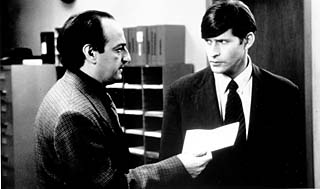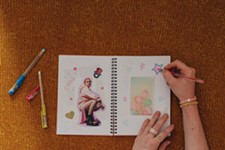Melville in Cubicle Hell
Jonathan Parker brings 'Bartleby' back to the future with freaky, geeky Crispin Glover
By Sidney Moody, Fri., June 14, 2002

"You're just jealous because I'm a real freak and you have to wear a mask," says the Penguin in an otherwise forgettable Batman sequel. It's a line that perfectly encapsulates the appeal of actor Crispin Hellion Glover, who doesn't need a mask to rub his own congenital freakishness in our faces. Since bursting into public consciousness as George McFly in Back to the Future, Glover has spent the bulk of his career specializing in oddball characters, from Andy Warhol to an Olivia Newton-John impersonator. Yet Glover's special gift is his uncanny ability to make these freaks and geeks likeable, even lovable.
That's why tyro film director Jonathan Parker has scored such a coup by casting Glover as the peculiar titular character in Bartleby, Parker's modernization of Herman Melville's short story "Bartleby the Scrivener." (Bartleby screened at the 2001 South by Southwest Film Festival.) Bartleby wangles his way into a job as a law clerk only to decline to perform his duties with no explanation except that he would "prefer not to." His penchant for preferring not to eventually devolves into a catatonic stupor. Melville never delved into Bartleby's motivation -- or lack thereof -- and so Bartleby has become a literary Rorschach inkblot test to which every sort of philosophical and metaphysical speculation has been attached. The character could have been dense or off-putting onscreen, but, through the actor's interpretation, comes across as the opposite. Glover reminds us, ever so subversively, that being so-called normal isn't all that it's cracked up to be. To be normal is to be safe, but can anyone say that being safe is fun?
Glover, currently shooting on location in Canada, "preferred not" to be interviewed, but director Parker (who's now at work on his next project, a loose adaptation of Henry James' The Bostonians) found time to speak with the Chronicle via telephone from his San Francisco office about Bartleby's origins, his leading man, and a few of his own preferences.
The Austin Chronicle: How did Bartleby come about?
Jonathan Parker: I was looking for an old story to update. I knew the story from having had it assigned in college. And then I came upon it just by accident again and realized when re-reading it that I had worked in that office for many years. I really recognized the office from my own work experience and thought it would make a really good independent film. It's a very complicated story, and the reason it has endured for so long is that it has no easy explanation or simple analysis. It's a story that functions on a lot of different levels.
AC: Are you aware of the theory that Bartleby is Melville's satire on Edgar Allen Poe with "I prefer not to" being an echo of "Quoth the raven, nevermore?"
JP: That is something that I have not heard before.
AC: So what made you decide to cast Crispin Glover?
JP: I've been a fan of Crispin from seeing him in Back to the Future and River's Edge, so we pretty much had him at the top of our list for that part. He really responded to it. He liked the idea of doing a classic work. He didn't know the story when we brought it to him, but he's very concerned with story, and there was very little dialogue to memorize, so that was probably a plus too.
AC: There's a Crispin Glover fanzine called Mister Density that I quote from: "Mr. Glover is the proverbial monkey wrench and he has thrust himself head-on into Hollywood and indirectly into this constricting cookie-cutter society."
JP: I think that Crispin is always attracted to characters outside the mainstream. I think he likes the idea of roles that really are on the edge of what society might consider normal behavior. But, having said that, his commitment to the part was done with the utmost professional abilities. He really is a dedicated and excellent actor.
AC: So I take it you enjoyed working with Crispin?
JP: He was very easy to work with. He's a filmmaker himself, so he was very helpful in the post-production process, giving us lots of notes on various cuts of the film. So he really stayed with it and was a big asset.
AC: Bartleby has a Day-Glo-ish color scheme in which certain characters are associated with certain colors. I noticed that the character Bartleby is repeatedly associated with the color green. Green wall behind his desk, green paper on his desk, even the cheese from the vending machine that he lives on is green. Why green?
JP: I'm not sure it was intentional that he would be associated with the color green. But the color scheme is obviously something that we paid a lot of attention to. The art director is my wife, Deborah Parker, and we obviously made a lot of projects together in the past. One of our inspirations: because of the civic nature of the work that they were doing in the office, we went to the local planning department in city hall here in our town of San Rafael in northern California and noticed that the building had probably been built in the early Seventies, and no one had bothered to change the interior decor since that time. And so we actually borrowed a lot of their furniture and went off on the idea that the office was decorated in that time frame and had never been altered. We researched early Seventies, late Seventies office interior design and used a lot of colors out of that era.
AC: You've associated Bartleby with the hum of a theremin. Would you care to comment on that?
JP: I did the score with Seth Arsanow, who is a guy I've been playing music with for many years. I started out as a musician before going into film. A lot of the original ideas we had for scoring the film didn't seem to work after we shot it, and we were stuck for an idea. He mentioned that he bought this thing on e-Bay a few months ago, and it happened to be a theremin. It is an extremely difficult instrument to learn how to play. You don't touch it; you wave your hands near it to change the pitch and change the volume. It's a little black box with a couple of antennae. And to play it well is really difficult, because the slightest movement of your hand affects the pitch. But he's an excellent musician, and he figured out how to play it. We have comic elements and we have dramatic elements in the movie, and the theremin bridged those two different tones and also turned out to be a great sound for the character of Bartleby because it has a little bit of an otherworldly quality.
AC: Why is Crispin always looking up at the air ventilator?
JP: [In] the short story [that's] manifested by a different element: Bartleby has a small window above him which provides the only natural light in the office, and he is frequently mentioned looking towards that light. In modernizing and making contemporary the story, I was trying to come up with some kind of equivalent, and I felt that the air conditioning vent provided a little natural air from outside, and so it was that kind of an inspiration.
AC: There's a scene where the boss (played by David Paymer) is instructing Bartleby to help him tie a ribbon, and then Crispin Glover goes through this really amazing series of gestures -- putting his hands behind his back, pouting, looking away, walking over to the window, etc. -- before saying he would prefer not to. How was this choreographed?
JP: It was pretty much totally Crispin. We were faced with a repeating circumstance of the boss requesting Bartleby to do a particular thing, and we collectively decided to play it differently each time. To try to make it change and evolve. The idea was that maybe this was the one instance where he actually considers obeying the boss' request. And he went through a number of poetic, graceful gesticulations before ultimately deciding that he would prefer not to.
AC: There's a dream scene in which a young woman that the boss had in his office in an earlier scene is lying naked on his desk. And then Bartleby comes in and lays down beside her, and she puts her arm around his head. Then there's a blurry office scene with Glover ranting in German. Would you care to comment on that?
JP: Crispin was instrumental in both of those [scenes]. I did want to do a dream sequence, and we had a couple of different ideas we were kicking around. I think the idea of Crispin getting the boss' girl was sort of an idea that, even in the realm of romance and sensitivity, Bartleby one-ups the boss in the boss' nightmare. Bartleby takes over the office and issues commands to all of the employees, and that kind of morphed into Crispin doing his Nazi gibberish routine that he had in his back pocket from some other experience. [Note: The back pocket that Mr. Parker is referring to is deeper than he suspects. Glover shares a birthday -- April 20 -- with Adolph Hitler. And on Glover's 1989 CD, The Big Problem, there's a track in which Glover does a Nazi routine similar to the one he does in Bartleby.]
AC: Melville writes that Bartleby is "the victim of innate and incurable disorder." What do you think that disorder might be?
JP: I prefer not to answer that question.
Bartleby opens in Austin this week for a limited run. See Film Listings for review.










